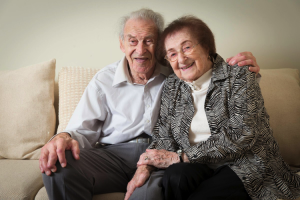Edgar Krasa and Defiant Requiem
By Susie Davidson
In the fall of 2000, Edgar Krasa’s phone rang. “Does the name Rafael Schächter mean anything to you?” asked the voice on the other end. “Enough so that I named one of my two sons after him,” Krasa responded.
Thus began a relationship between the two, one a survivor of the Terezín concentration camp outside of Prague, the other a musical scholar and Resident Conductor of the Oregon Symphony. Their collaboration, both personal, and purposeful, will be debuted in Boston on January 27, when Symphony Hall plays host to the city’s premiere of conductor Murry Sidlin’s Defiant Requiem: Verdi at Terezín, and Krasa is honored along with his wife, and fellow Terezín inmate, Hana.
Sidlin’s inspired tribute to the performances of Verdi’s Requiem, led by pianist and fellow conductor Schächter, began at a Minneapolis bookstall in 1994. As he perused a book about the chorus of 150 prisoners in 1944 singing the Catholic Mass for the Dead to Nazis, visitors to the camp, and Red Cross representatives, Sidlin, who had Holocaust victims in his own family, was struck with wonder.
He learned that the lyrics, about Judgment Day, and accountability for one’s sins, became an artistic mode of protest at the camp, where the Nazis imprisoned many of Eastern Europe’s top Jewish artists and musicians, and where, under great risk, Schächter and the inmates sang these Latin words of defiance toward their captors.
Tragically, Schächter perished just before liberation on a death march after surviving Auschwitz. But the story lives on in Sidlin’s musical concert/drama Defiant Requiem: Verdi at Terezín, to be performed at Symphony Hall on the anniversary of the liberation of Auschwitz and UN International Holocaust Remembrance Day. The story is also retold in historical context in Partisan Pictures’ Emmy-nominated film Defiant Requiem which depicts, through concert footage, survivor remembrances, animated clips, photos, and prisoner artwork, Sidlin’s commemorative performance in 2006 of Defiant Requiem back where it began, in Terezín.
 Krasa, who was Schächter’s roommate in the camp and sang in the choir, was the cook at the impenetrable and inescapable former fortress. Through a former employer, he had struck a deal to operate the kitchen at Terezín in exchange for the protection of his parents. There, he also participated in Schächter’s musical productions at the virtual Nazi propaganda site, where artists, musicians and teachers, under starvation conditions, established a pseudo-cultural mecca as they continued to create works that the Nazis duplicitously promoted as proof of a permissive society.
Krasa, who was Schächter’s roommate in the camp and sang in the choir, was the cook at the impenetrable and inescapable former fortress. Through a former employer, he had struck a deal to operate the kitchen at Terezín in exchange for the protection of his parents. There, he also participated in Schächter’s musical productions at the virtual Nazi propaganda site, where artists, musicians and teachers, under starvation conditions, established a pseudo-cultural mecca as they continued to create works that the Nazis duplicitously promoted as proof of a permissive society.
Schächter’s cast members were continually deported to death camps, and eventually, after the final, storied Requiem performance for members of the International Red Cross and the Nazi high command on June 23, 1944, Krasa found himself at camps that included Auschwitz, from where he embarked on a death march that preceded his liberation – but not before he had given up walking, was shot, and lay bleeding and taken for dead by the roadside.
Krasa survived, married, and lived in Israel before immigrating to the U.S., where he established a career as a chef at several restaurants and manager of food services at the Hebrew Rehabilitation Center in Roslindale, MA. He continues to tell the story of Rafael Schächter for schools and civic organizations. He and Hana have two sons, Daniel and Raphael, who will sing in the Boston performance of Defiant Requiem, as will one of the Krasa’s four grandchildren, Raphael’s son Alexander.
His descendants bring it back home for Krasa, and on January 27 at Symphony Hall in Boston, audience members can see this come full circle for themselves and share in paying tribute to one man’s emergence from the brink of death to boldly retelling this tale of friendship and survival. Defiant Requiem: Verdi at Terezín is a moving performance that gives this unforgettable story of courage and resistance its place in history.
Susie Davidson, who has authored several books on local Holocaust survivors, is a regular contributor to the Jewish Advocate and has written for the Jewish Daily Forward, the Lowell Sun, the Lawrence Eagle-Tribune, the Charlestown Patriot-Bridge, the Cambridge Chronicle, the Brookline Tab, and other local and international media including the Jerusalem Post and Ha’aretz.


